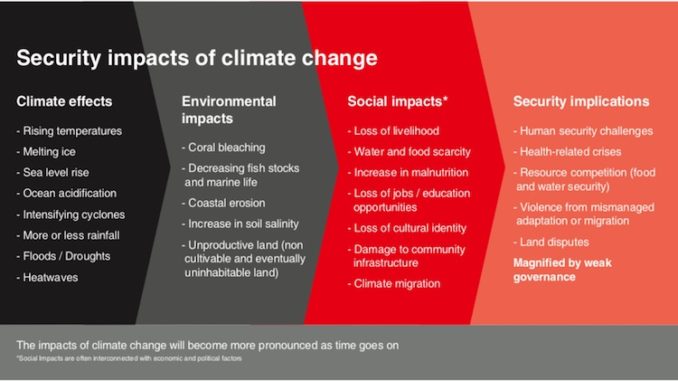
Minister of Defence Ron Mark and Minister for Climate Change James Shaw have today released a Defence Assessment on the security implications of climate change.
The Climate Crisis: Defence Readiness and Responsibilities explores the implications of climate change for New Zealand Defence Force operations.
It identifies climate change as one of the most significant security threats of our time, and one that is already having adverse impacts both at home and in New Zealand’s neighbourhood.
“This Government is committed to ensuring New Zealand does its part to address climate change,” says Ron Mark. “This means both contributing to mitigating climate change itself, and working with our international partners to respond to the intensifying impacts climate change will bring.
“Earlier this year the Government’s Strategic Defence Policy Statement recognised climate change will have a big impact on Defence operations, particularly in the Pacific.
“It proceeded to highlight that disruptive weather patterns are causing an increased frequency and intensity of weather extremes such as cyclones, rainfall events, droughts, and flooding from sea level rise. In addition, the state of the Southern Ocean is changing, meaning our current vessels are getting close to the limits of being able to operate safely.
“Therefore it stands to reason that we needed to look deeper in order to better understand the social and security implications of climate change, and what our Defence Force will face when it responds to these weather events.
“The assessment released today identifies the particular security impacts which may arise, including vulnerable populations losing their economic livelihoods, increased food and water scarcity, malnutrition, climate migration, health related crises, competition for resources, land disputes and the potential for increased violence from mismanaged adaptation or migration.
“This assessment is a necessary first step. It makes it clear that Defence will have to adapt to meet the challenges posed by this emerging threat to our security. We are now using this assessment to inform our review of the Defence Capability Plan, which I expect to release early next year,” says Ron Mark.
“The Coalition Government already has a work programme underway to help alleviate the effects of climate change. This includes re-energised Pacific policy settings, the development of a new climate change law, and the commitment to make 100 percent of New Zealand’s electricity renewable by 2035,” says James Shaw.
“This assessment is an important addition to the work the Government is doing, and it really hammers home why it’s important we act now to combat climate change in our region. If we don’t, communities will suffer, and this Government will not stand by doing nothing.
“At the 2018 Pacific Islands Forum, leaders affirmed that climate change presents the single greatest threat to the livelihood, security and wellbeing of Pacific people. Defence has stepped up and is thinking very seriously about how this will impact us here in New Zealand and our region as a whole, and how we will need to respond,” says James Shaw
It has been produced by the Ministry of Defence in consultation with the New Zealand Defence Force, other New Zealand agencies, Pacific partners and academics.





